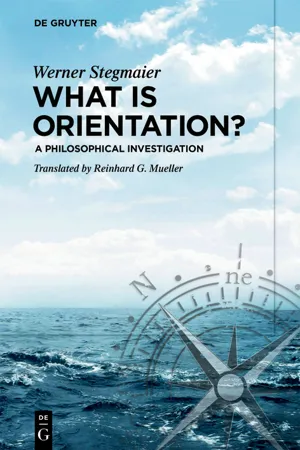
- 315 pages
- English
- ePUB (mobile friendly)
- Available on iOS & Android
About This Book
The very first thing one does in all situations of life is orient oneself. Decisions of orientation, which are mostly made under uncertainty and the pressure of time, largely determine subsequent decisions. But what is orientation? The problems of orientation are as old as humankind, the word is used everywhere, but the concept has never been thoroughly investigated. The philosopher Werner Stegmaier comprehensively clarifies for the first time the conditions and structures of orientation, including those of our sexual, economic, media, political, legal, scientific, artistic, religious, moral, and ethical orientations. He thereby establishes a new philosophical language and offers a philosophy for our time.
"As if I unexpectedly slipped down into a deep vortex, I am swirled around in a way that I can neither put a foot down, nor swim to the surface. Nonetheless, I will work my way out … " (René Descartes, Philosopher)
"As often as my speculation seems to lead me too far from the paved road of common sense, I stand still and seek to orient myself. I look back at the point from which we started, and I seek to compare the two guideposts I have." (Moses Mendelssohn, Philosopher)
"A philosophical problem has the form: 'I do not know my way about.'" (Ludwig Wittgenstein, Philosopher)
"The second O, orientation – as the repository of our genetic heritage, cultural tradition, and previous experiences – is the most important part of the O-O-D-A loop since it shapes the way we o bserve, the way we d ecide, the way we a ct." (John Boyd, Military Strategist)
Frequently asked questions
Information
Table of contents
- Cover
- Title Page
- Copyright
- Content
- Preface
- Introduction
- Chapter 1 Pre-Orientations
- Chapter 2 First Clues: Occurrences of Orientation
- Chapter 3 The Situation of Orientation: Time Pressure
- Chapter 4 The Selectivity of Orientation: Views
- Chapter 5 The Self-Arranging of Orientations by means of Horizons, Standpoints, and Perspectives
- Chapter 6 Hold in Orientation: Points of Reference, Clues, Leads, and Footholds
- Chapter 7 Signs as Footholds: Orientation as an Art of World Abbreviation
- Chapter 8 The Self-Stabilization and Self-Differentiation of Orientation: Routines, Transposed Continuities, and Orientation Worlds
- Chapter 9 The Self-Reflection of Orientation: Leeways of Thinking
- Chapter 10 Mutual Orientation: Interaction and Communication
- Chapter 11 The Stabilization and Differentiation of Mutual Orientation: Respecting Identities
- Chapter 12 Reckoning with Other Orientations: Economic, Mass Media, Political, and Legal Orientations
- Chapter 13 The Critical Disciplining of Orientation, Its Creative Disorientation, and the Hold on the Eternally Ungraspable: Science, Art, and Religion
- Chapter 14 The Self-Binding of Orientation: Moral Orientation
- Chapter 15 The Self-Reflection of Moral Orientation: Ethical Orientation
- Chapter 16 World Orientation in Globalized Communication
- Chapter 17 Metaphysics in Our Orientation
- Chapter 18 The End of Orientation
- Endnotes
- Index